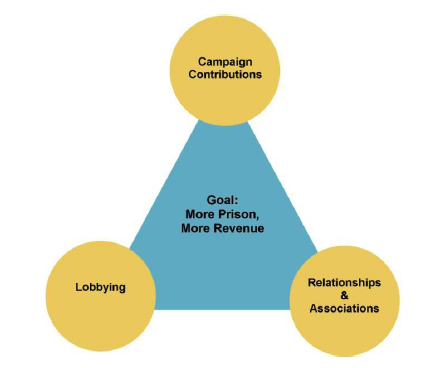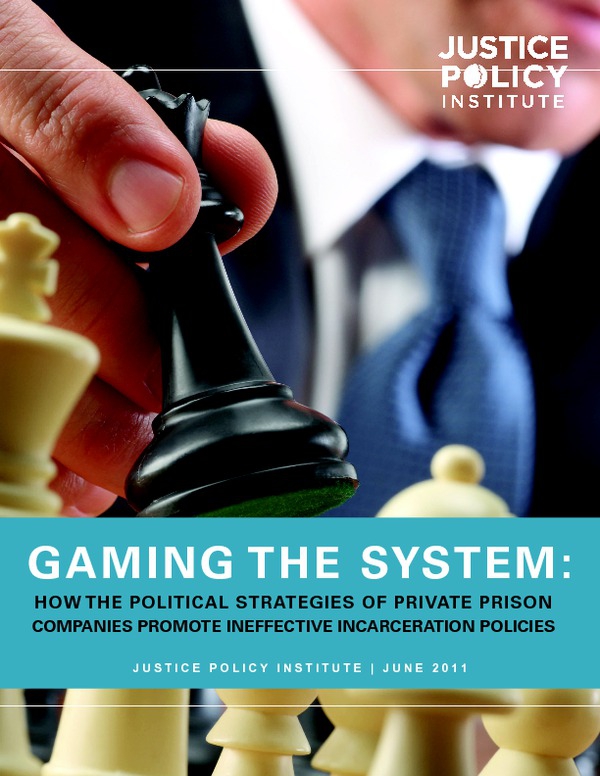From the Open-Publishing Calendar
From the Open-Publishing Newswire
Indybay Feature
Gaming the System: How Private Prison Companies Buy Politicians to Promote Increased Incarceration
At a time when many policymakers are looking at criminal and juvenile just ice reforms that would safely shrink the size of our prison population, the existence of private prison companies creates a countervailing interest in preserving the current approach to criminal justice and increasing the use of incarceration. [Full report below]

[THE TRIANGLE OF PRIVATE PRISON POLITICAL INFLUENCE]
Approximately 129,000 people were held in privately managed correctional facilities in the United States as of December 31, 2009;2 16.4 percent of federal and 6.8 percent of state populations were held in private facilities. Since 2000, private prisons have increased their share of the ‚market‛ substantially: the number of people held in private federal facilities increased approximately 120 percent, while the number held in private state facilities increased approximately 33 percent. During this same period, the total number of people in prison increased less than 16 percent. Meanwhile, spending on corrections has increased 72 percent since 1997, to $74 billion in 2007.3 The two largest private prison companies, Corrections Corporation of America (CCA) and GEO Group, combined had over $2.9 billion in revenue in 2010.4 While private prison companies may try to present themselves as just meeting existing ‚demand‛ for prison beds and responding to current ‚market‛ conditions, in fact they have worked hard over the past decade to create markets for their product. As revenues of private prison companies have grown over the past decade, the companies have had more resources with which to build political power, and they have used this power to promote policies that lead to higher rates of incarceration. The pro-incarceration policies that private prison companies promote do nothing to improve communities or cut costs, and may actually have the opposite effect. Policymakers should be focused on long-term solutions to improving public safety, saving money and promoting healthy communities by looking at ways to reduce the number of people in prison, not increase them, and by finding ways to keep people out of the justice system before they become involved. Private prison companies are in it for the money. Policymakers should be in it for healthy, safe communities.
---------------------------------------------------------------------------------------------
Justice Policy Institute is a national nonprofit organization that changes the conversation around justice reform and advances policies that promote well-being and justice for all people and communities.
1012 14th Street, NW, Suite 400
Washington, DC 20005
TEL (202) 558-7974
FAX (202) 558-7978
Approximately 129,000 people were held in privately managed correctional facilities in the United States as of December 31, 2009;2 16.4 percent of federal and 6.8 percent of state populations were held in private facilities. Since 2000, private prisons have increased their share of the ‚market‛ substantially: the number of people held in private federal facilities increased approximately 120 percent, while the number held in private state facilities increased approximately 33 percent. During this same period, the total number of people in prison increased less than 16 percent. Meanwhile, spending on corrections has increased 72 percent since 1997, to $74 billion in 2007.3 The two largest private prison companies, Corrections Corporation of America (CCA) and GEO Group, combined had over $2.9 billion in revenue in 2010.4 While private prison companies may try to present themselves as just meeting existing ‚demand‛ for prison beds and responding to current ‚market‛ conditions, in fact they have worked hard over the past decade to create markets for their product. As revenues of private prison companies have grown over the past decade, the companies have had more resources with which to build political power, and they have used this power to promote policies that lead to higher rates of incarceration. The pro-incarceration policies that private prison companies promote do nothing to improve communities or cut costs, and may actually have the opposite effect. Policymakers should be focused on long-term solutions to improving public safety, saving money and promoting healthy communities by looking at ways to reduce the number of people in prison, not increase them, and by finding ways to keep people out of the justice system before they become involved. Private prison companies are in it for the money. Policymakers should be in it for healthy, safe communities.
---------------------------------------------------------------------------------------------
Justice Policy Institute is a national nonprofit organization that changes the conversation around justice reform and advances policies that promote well-being and justice for all people and communities.
1012 14th Street, NW, Suite 400
Washington, DC 20005
TEL (202) 558-7974
FAX (202) 558-7978
For more information:
http://WWW.JUSTICEPOLICY.ORG
Add Your Comments
Latest Comments
Listed below are the latest comments about this post.
These comments are submitted anonymously by website visitors.
TITLE
AUTHOR
DATE
Prisons for Fun and Profit
Sat, Jun 25, 2011 3:22AM
We are 100% volunteer and depend on your participation to sustain our efforts!
Get Involved
If you'd like to help with maintaining or developing the website, contact us.
Publish
Publish your stories and upcoming events on Indybay.
Topics
More
Search Indybay's Archives
Advanced Search
►
▼
IMC Network



